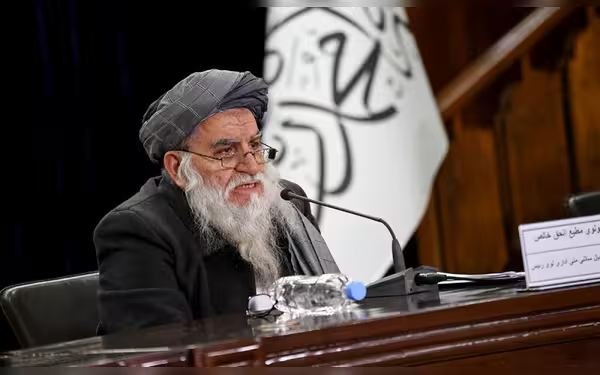Sunday, December 22, 2024 10:00 AM
Afghanistan's Call for Inclusion in Climate Talks
- Afghanistan seeks participation in future climate discussions.
- COP29 marked Afghanistan's first international climate event since Taliban takeover.
- Urgent action needed to address Afghanistan's climate vulnerability.
 Image Credits: brecorder
Image Credits: brecorderAfghanistan urges inclusion in future climate talks, emphasizing its vulnerability and need for global support.
KABUL: The issue of climate change is becoming increasingly urgent, and Afghanistan, despite its political challenges, is making a case for its participation in global climate discussions. Recently, an Afghan environment official emphasized the necessity for the country to be included in future climate talks, following its attendance at COP29 in Baku. This marked a significant moment as it was the first time since the Taliban took control in August 2021 that an Afghan delegation was present at such an important international event.
At COP29, the Afghan delegation was invited as "guests" by the Azerbaijani hosts, which meant they were not directly involved in the negotiations. This was a notable change, as Afghanistan had been unable to attend the previous two COPs held in Egypt and the United Arab Emirates. Matiul Haq Khalis, the director general of Afghanistan’s National Environmental Protection Agency, expressed the importance of Afghanistan's participation, stating, "Afghanistan must participate in such conferences in the future." He described the attendance at COP29 as a "big achievement" for the nation.
Khalis highlighted that the Afghan delegation aimed to raise awareness about the pressing issues facing the country, including the needs of its people. He mentioned that they engaged in discussions with "19 different organisations and governments," including representatives from Russia, Qatar, Azerbaijan, and Bangladesh. This engagement is crucial for Afghanistan, which is one of the countries most vulnerable to the impacts of climate change, despite contributing minimal emissions.
The Taliban government has argued that their political isolation should not prevent them from participating in international climate discussions. Since taking power, they have enforced a strict interpretation of sharia law, which has led to significant restrictions on women's rights and participation in public life. The United Nations has described this situation as a form of "gender apartheid," raising concerns about the humanitarian situation in the country.
Afghanistan's vulnerability to climate change is alarming. The country has faced decades of conflict, making it one of the poorest nations globally. Scientists warn that climate change is exacerbating extreme weather events, leading to prolonged droughts, frequent floods, and declining agricultural productivity. The United Nations has called for urgent action to help Afghanistan build resilience against these challenges and has advocated for the country's involvement in international climate talks.
Developed nations have pledged to provide $100 billion annually in climate finance through 2025 to assist developing countries in preparing for the worsening impacts of climate change and transitioning away from fossil fuels. As Afghanistan seeks to navigate its complex political landscape, the call for participation in climate discussions is not just about representation; it is about ensuring that the voices of its people are heard on a global stage.
The participation of Afghanistan in future climate talks is essential not only for the country itself but also for the global community. As climate change knows no borders, it is imperative that all nations, regardless of their political situations, come together to address this pressing issue. The world must listen to Afghanistan's needs and work collaboratively to build a sustainable future for all.













